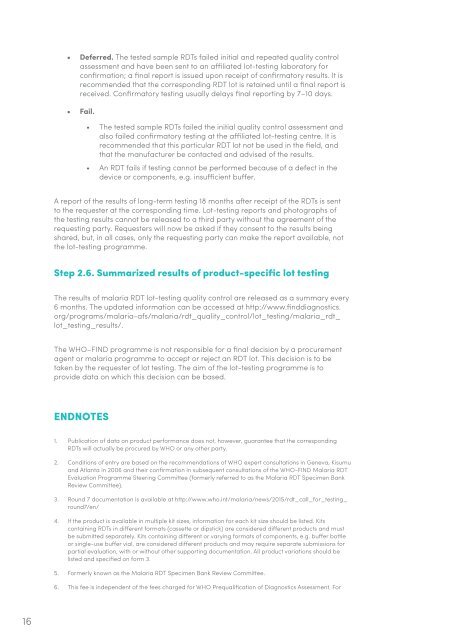WHO-2015_Procedures-malaria-RDT-productlot-testing
WHO-2015_Procedures-malaria-RDT-productlot-testing
WHO-2015_Procedures-malaria-RDT-productlot-testing
You also want an ePaper? Increase the reach of your titles
YUMPU automatically turns print PDFs into web optimized ePapers that Google loves.
• Deferred. The tested sample <strong>RDT</strong>s failed initial and repeated quality control<br />
assessment and have been sent to an affiliated lot-<strong>testing</strong> laboratory for<br />
confirmation; a final report is issued upon receipt of confirmatory results. It is<br />
recommended that the corresponding <strong>RDT</strong> lot is retained until a final report is<br />
received. Confirmatory <strong>testing</strong> usually delays final reporting by 7–10 days.<br />
• Fail.<br />
• The tested sample <strong>RDT</strong>s failed the initial quality control assessment and<br />
also failed confirmatory <strong>testing</strong> at the affiliated lot-<strong>testing</strong> centre. It is<br />
recommended that this particular <strong>RDT</strong> lot not be used in the field, and<br />
that the manufacturer be contacted and advised of the results.<br />
• An <strong>RDT</strong> fails if <strong>testing</strong> cannot be performed because of a defect in the<br />
device or components, e.g. insufficient buffer.<br />
A report of the results of long-term <strong>testing</strong> 18 months after receipt of the <strong>RDT</strong>s is sent<br />
to the requester at the corresponding time. Lot-<strong>testing</strong> reports and photographs of<br />
the <strong>testing</strong> results cannot be released to a third party without the agreement of the<br />
requesting party. Requesters will now be asked if they consent to the results being<br />
shared, but, in all cases, only the requesting party can make the report available, not<br />
the lot-<strong>testing</strong> programme.<br />
Step 2.6. Summarized results of product-specific lot <strong>testing</strong><br />
The results of <strong>malaria</strong> <strong>RDT</strong> lot-<strong>testing</strong> quality control are released as a summary every<br />
6 months. The updated information can be accessed at http://www.finddiagnostics.<br />
org/programs/<strong>malaria</strong>-afs/<strong>malaria</strong>/rdt_quality_control/lot_<strong>testing</strong>/<strong>malaria</strong>_rdt_<br />
lot_<strong>testing</strong>_results/.<br />
The <strong>WHO</strong>–FIND programme is not responsible for a final decision by a procurement<br />
agent or <strong>malaria</strong> programme to accept or reject an <strong>RDT</strong> lot. This decision is to be<br />
taken by the requester of lot <strong>testing</strong>. The aim of the lot-<strong>testing</strong> programme is to<br />
provide data on which this decision can be based.<br />
Endnotes<br />
1. Publication of data on product performance does not, however, guarantee that the corresponding<br />
<strong>RDT</strong>s will actually be procured by <strong>WHO</strong> or any other party.<br />
2. Conditions of entry are based on the recommendations of <strong>WHO</strong> expert consultations in Geneva, Kisumu<br />
and Atlanta in 2006 and their confirmation in subsequent consultations of the <strong>WHO</strong>-FIND Malaria <strong>RDT</strong><br />
Evaluation Programme Steering Committee (formerly referred to as the Malaria <strong>RDT</strong> Specimen Bank<br />
Review Committee).<br />
3. Round 7 documentation is available at http://www.who.int/<strong>malaria</strong>/news/<strong>2015</strong>/rdt_call_for_<strong>testing</strong>_<br />
round7/en/<br />
4. If the product is available in multiple kit sizes, information for each kit size should be listed. Kits<br />
containing <strong>RDT</strong>s in different formats (cassette or dipstick) are considered different products and must<br />
be submitted separately. Kits containing different or varying formats of components, e.g. buffer bottle<br />
or single-use buffer vial, are considered different products and may require separate submissions for<br />
partial evaluation, with or without other supporting documentation. All product variations should be<br />
listed and specified on form 3.<br />
5. Formerly known as the Malaria <strong>RDT</strong> Specimen Bank Review Committee.<br />
6. This fee is independent of the fees charged for <strong>WHO</strong> Prequalification of Diagnostics Assessment. For<br />
16


